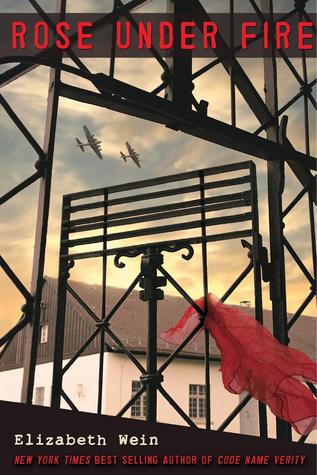Elizabeth Wein is a hero. If the act of merely reading her books is sufficient enough to make me feel like I’m choking on air, I can’t even imagine what’s it like for her to conceive her books in her head and bleed life into the pages with her fingers. Code Name Verity damn near killed me. The companion novel Rose Under Fire killed me. Even though CNV is not a reading prerequisite for RUF, it will help many a haplessly clueless reader ease into unfamiliar territory.
I completed RUF some time back. At that time, I felt I was in an emotionally compromised state to write a coherent review. Deciding to put some time between the reading and the reviewing is one of my more brilliant ideas. If this book is on your TBR pile as well, you’ll know why eventually.
Anyway, being an Ignorant American Schoolgirl gives me an open ticket to ask brazen questions, and I’d already put my foot in my mouth, so I just went on.
“What is a concentration camp, Fliss?”
Given an opportunity, I have never failed to manage to squeeze in a reminder that I love historical fiction. Consequently, I have greatly taken advantage of fiction under the backdrop of the World Wars and the Holocaust, whether in print or on screen. I thought I knew what concentration camps are. I thought I knew what went on in there. I thought I was better than Rosie.
My mistake.
Rose Justice is an ATA pilot – out of America and in England, chasing her love for planes. For her, the horrors happening in Germany and elsewhere was an abstract idea – she knew people were dying and they needed saving. For her, the real tragedy lay in Doodlebug Brides and couples getting married in haste and boys fiddling with unexploded bombs in the hopes they can defuse them. Then again, she’s just eighteen years old crazily in love with flying in the sky and writing poems.
Everywhere I go I meet people who are hunting for husbands, mothers, children, brothers, sisters, cousins, friends, lovers, and they are all gone.
Your friend Rose has evaporated with them. I don’t know what else to tell you Maddie.
Then the horror accounts start. How they start by taking away your name and giving you a number. We hear about fleas who are in league with the SS. About 50,000 women locked inside a prison half a mile wide and a quarter of a mile across with no toilets. We learn of Rabbits. Our lives are changed forever.
When you lost hope, you turned into a schmootzich, one of the mindless beggars who were the bottom-crawlers of that entire scummy camp, or you died.
If you think this book is one of those books that preach nothing but morbidity and mortal moroseness in the name of empathy, you are dead wrong. This is not one of those books. This is that book that inspires awe. Awe at how much life and hope and dreams can thrive even in places that seem beyond despair.
It took me a long time to write ‘The Subtle Briar’, but it was translated into three languages in a day. Every time it got passed on I got another bread ration. Oh God, we needed something to cling to. We were scared.
The technical bits about bombs and planes, the poems and the characters are what sets the book apart from its peers. Many might feel the tech stuff is infodump but I lived for it. The Subtle Briar and Playing Statues are my favourites. Róza, Irina, Karolina, Lisette, Micheline, Elodie are my favourites. Even Anna. And Nick from the Nick stories. You will be rendered unable to label them fictional characters because of the sheer depth Wein has endowed them with, which is an accomplishment considering the number of characters this book is peppered with.
When you’re flying, the changing balance of lift and weight pulls you up and down. But another pair of forces pulls you forward or backwards through air: thrust and drag.
From Kite Flying: four principles of flight (by Rose Justice)
I think what made me love this book is the fact that there are no unnecessary deaths. (And by that, I am in no way claiming that the deaths that do happen were necessary.) I have noticed a disturbingly common authorial tendency to wantonly disregard fictional characters’ lives. Like they think killing off someone we love in our faces and the tears and heartbreak that inevitably follow is the price of loving a book. But Rose Under Fire does not resort to any such cheap tricks even though it could have and I love it all the more for it.
VERDICT: Freaking Five Stars

